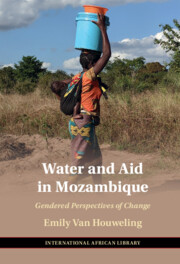Book contents
- Water and Aid in Mozambique
- The International African Library
- Water and Aid in Mozambique
- Copyright page
- Contents
- Figures
- Acknowledgements
- 1 Introduction
- 2 Divergent Development Discourses
- 3 Life before the Handpumps
- 4 Sustainability and Sense of Ownership
- 5 The Politics of Water Access
- 6 Gender Roles and Water Practices with the Handpumps
- 7 Development Encounters
- 8 Conclusions
- Glossary
- References
- Index
- Titles in the Series
4 - Sustainability and Sense of Ownership
Published online by Cambridge University Press: 18 August 2022
- Water and Aid in Mozambique
- The International African Library
- Water and Aid in Mozambique
- Copyright page
- Contents
- Figures
- Acknowledgements
- 1 Introduction
- 2 Divergent Development Discourses
- 3 Life before the Handpumps
- 4 Sustainability and Sense of Ownership
- 5 The Politics of Water Access
- 6 Gender Roles and Water Practices with the Handpumps
- 7 Development Encounters
- 8 Conclusions
- Glossary
- References
- Index
- Titles in the Series
Summary
In Chapter 4, I explore the concept of local ownership advanced in the project plans and argue that divergent perspectives of value and ownership among actors were at the heart of sustainability challenges. The Millennium Challenge Corporation sought to inspire community ownership through participation, voluntary management, and payment for water. Tensions with its neoliberal and community development approach skewed the balance of rights and responsibilities maintained by water users at rivers and wells. The project brought communities new burdens and also restricted their rights and control over the water. Likewise, the district government offices were tasked with maintaining the pumps over the long term, yet they were not consulted during the planning stages and had minimal capacity and resources. The rural water project focused on the legal/economic layers of property rights while ignoring the social practices, ideologies, and social relations that shaped the way people related to water in Nampula. The project’s attempts to commodify water were mediated by social relations in the community; water payments created conflicts between certain groups, inspired suspicion and distrust, and led to the breakdown of the water committees.
- Type
- Chapter
- Information
- Water and Aid in MozambiqueGendered Perspectives of Change, pp. 88 - 112Publisher: Cambridge University PressPrint publication year: 2022



